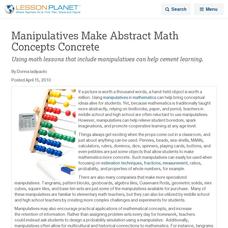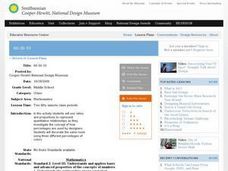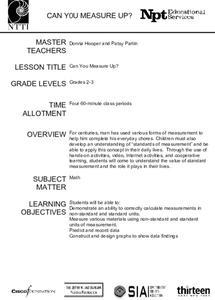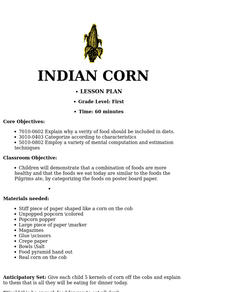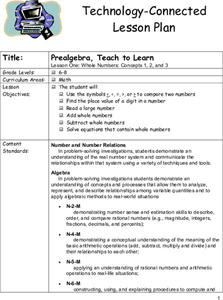Curated OER
Manipulatives Make Abstract Math Concepts Concrete
Using math lessons that include manipulatives can help cement learning.
Curated OER
60-30-10
Students use ratios and proportions to represent quantitative relationships as they investigate the concept of how percentages are used by designers. Students decorate the same room using three different percentages of colors.
Curated OER
Mental Money
Students access prior knowledge to round numbers and add decimals. In this mental math lesson, students share the book Betcha and calculate estimates for three jars based on the book. Students calculate money answers based on coins...
Curated OER
What Do We Do With A Dirty Bomb?
Students examine composition of dirty bomb and its possible effects on a city, and investigate simulations of such an event; students use computational and problem solving skills to assess damage and prepare report proposing solution to...
Curated OER
Can You Measure Up?
Here is a well-designed lesson on common standards of measurement for your young mathematicians. In it, learners calculate measurements in standard and non-standard units. They make predictions, record data, and construct and design...
Curated OER
Area and Perimeter Activities
Read this article before you begin teaching geometry! It gives teachers some insight into the world of teaching geometry to young learners, and four area and perimeter lessons are attached.
University of Georgia
Endothermic and Exothermic Reactions
Equip your chemistry class with the tools to properly understand endothermic and exothermic reactions. Young chemists collect, analyze, and graph data to determine how the Law of Conservation of Matter is applied to chemical composition...
University of Georgia
Energy Content of Foods
Why do athletes load up on carbohydrates the evening before a competition? The lesson helps answer this question as it relates the type of food to the amount of energy it contains. After a discussion, scholars perform an experiment to...
Partnership for Educating Colorado Students
Mayan Mathematics and Architecture
Take young scholars on a trip through history with this unit on the mathematics and architecture of the Mayan civilization. Starting with a introduction to their base twenty number system and the symbols they used, this eight-lesson unit...
National Security Agency
Time After Time
Save those precious minutes and hours spent planning math lessons with this mini-unit on telling time. Offering a series of engaging hands-on and collaborative learning activities, these three lessons teach children how to read analog...
EngageNY
Bacteria and Exponential Growth
It's scary how fast bacteria can grow — exponentially. Class members solve exponential equations, including those modeling bacteria and population growth. Lesson emphasizes numerical approaches rather than graphical or algebraic.
Noyce Foundation
Parallelogram
Parallelograms are pairs of triangles all the way around. Pupils measure to determine the area and perimeter of a parallelogram. They then find the area of the tirangles formed by drawing a diagonal of the parallelogram and compare their...
Curated OER
Estimating The Number Of Civilizations In The Milky Way Galaxy
Learners estimate the number of civilizations in the galaxy by first estimating the number of craters on the Moon and then by performing estimates of multiple-variable systems culminating in the use of the Drake Equation.
Curated OER
In the Bag!
Pupils calculate how many quarters are in a $1,000 bag (after learning the dollar value of filled coin bags). They explain their problem-solving strategy using pictures, numbers, equations, and/or words.
Curated OER
Indian Corn
First graders demonstrate that eating combinations of food is very healthy. They discover that foods we eat today are similar to the foods the Pilgrims ate by categorizing the foods on poster board paper.
Curated OER
Cross Country Adventure
Students practice measurement and geography in this lesson. They build a Lego vehicle using an RCX. They predict how many seconds it will take their vehicle to reach a specific state on the United States of America map that each group of...
Curated OER
Linear Modelling of the Life Expectancy of Canadians
Middle and high schoolers explore the concept of linear modelling. In this linear modelling lesson, pupils find the line of best fit for life expectancy data of Canadians. They compare life expectancies of men and women, and find the...
Curated OER
Whole Numbers
Student are assigned one of the sections on whole numbers. After reviewing the content, they teach their assigned sections to other class mates. They publish their findings on a PowerPoint slide show to use when they teach their section.
Curated OER
Measuring the Flagpole
Studets practice problem solving and comparison of quantities, ratios and prproportions. They develop a plan for determining the height of a flagpole complete with drawings and calculations. In addition, they complete a written...
Curated OER
Euler's Method
In this calculus activity, students answer 14 short-answer questions regarding Euler's Method, rate equations, initial conditions, and slope functions.
Curated OER
Why Are Hot Things Red?
In this radiation and temperature activity, students use 2 methods to derive the Wein Displacement law that shows the relationship between the temperature of a body to the frequency where the Planck curve's value is at its maximum....
Curated OER
Dividing by 3's
Third graders review and practice strategies for solving division problems. In this division by 3's instructional activity, 3rd graders play games, use an interactive whiteboard, create flashcards, and solve word problems.
Curated OER
Dividing by 4's
Third graders explore math functions by completing problem solving activities. For this division lesson, 3rd graders utilize the division strategies acquired earlier to divide multiple digit numbers by 4's. Students complete problems on...


